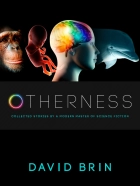First, it seems I’ll be made fun of (in good humor) on Comedy Central’s The Colbert Report, on January 7 (subject to change), while helping my favorite show explore the concept of “dangerous aliens!” Help spread the word! Sure, I’ll be edited to look silly, but anything for laughs… and for that Colbert Bump!
 The Future of “Free” Media
The Future of “Free” Media
Will the current “everything is free” version of the Internet last? We’ve grown used to being able to hop about like gods, sampling almost everything out there, without having to pay a dime. There are plenty of wise folks out there who predicted the collapse of this model, for a long time. Sooner or later, they may prove to be right.
In a fascinating interview, Michael Whalen, award winning composer and new media observer, discusses the challenges facing those who create and delivering “content.” He correctly (I think) sees the monopolistic control model of content-delivering “pipes” collapsing into a vast lake, though this won’t benefit the content owners, either.
Moreover, the makers of specific mobile hardware will matter less and less. Money will still be made by each year’s best device maker, but it will remain a hardscrabble, highly competitive world. Device-making will not be a robust business model for steady and ongoing profit.
So far, so likely to be true. But what Whalen misses is the other shoe that must drop, and that is the inherent problem in re: advertising. We’ve grown used to viewing Adverts as the great monetizer, the prop that can convert raw numbers of “eyeball” attention-seconds into support for the vast lake of quasi-free content. This model has worked far longer than I would have expected, supporting Hulu, YouTube, Facebook, Yahoo and so many other content delivery systems one can barely count them all.
Almost alone, I have long viewed this as a bubble, of sorts, perhaps even of the tulip variety. This vast house of cards may prove very hard to support, especially once companies get used to highly targeted AdSense-style ads delivering the actual information consumers need, in order to buy the actual products they want.
Will online advertising collapse like an over-inflated bubble? I haven’t heard anybody else say this, but I think it might be the next shoe to drop. And if it does, what will happen to all that free content people are so used-to?
 As I see it, there are a few models out there. One is pay as you use… either through fee-entry sites like the NY Times or through content aggregators likeiTunes and the varied Ap stores. The aggregators are likely to expand. Indeed, this is one reason why I am clinging to my AAPL stock, because they are well placed to be leaders in this role.
As I see it, there are a few models out there. One is pay as you use… either through fee-entry sites like the NY Times or through content aggregators likeiTunes and the varied Ap stores. The aggregators are likely to expand. Indeed, this is one reason why I am clinging to my AAPL stock, because they are well placed to be leaders in this role.
I am less-sanguine about individual pay-for-content, like the NYTimes is trying to set up. I part with most critics over why it won’t work, though. Most say that the public is used to free content and hates to pay. Wrong. People are willing to pay.
What they hate is the current inconvenience of paying. Having to type in name/email and password, or credit card info, or even using PayPal to do their rapid click-surfs for interesting content.
 “I’d pay a nickel for that, but don’t slow me down!” That is the attitude I am hearing.
“I’d pay a nickel for that, but don’t slow me down!” That is the attitude I am hearing.
The problem is that PayPal is very badly set up to handle the kind of micro-payments that would enable Salon and the NYTimes to charge the reasonable (say) one-cent per view that people would be willing to pay. Seriously, a venture capitalist who invested in the next kind of PayPal… one that gets the micropayments wagon rolling… could make a ton, once ten million people are signed aboard. A fantastic business opportunity, but it would take a fellow with patience and deep pockets.
(In fact, I know a few tricks that would make it easier and bypass some of the problems. Daring investor out there? 😉
Another model is Rhapsody… clubs and subscription services that let you pay monthly and access content without ever thinking twice, after that. If advertising collapses, you’ll see such services abound. People will have the click-grab feel of free content, in daily use, but pay willingly a fair monthly rate, as in Netflix. It would work and bypass much of the “Net Neutrality” problems. (I wrote about both of these methods in The Transparent Society (1997).
Then there’s the notion that advertising will be an ever-growing subsidy, forever. I could be wrong.
A fourth system of content generation and delivery is the one Whalen speaks of: ” I think we’re going back to the 19th century in terms of the “status” of artists. They’ll be figureheads. Imagine: like Paris or Vienna of the 1900s, we’ll have wealthy patrons and small clutches of people who support the art of “real” artists. In this environment, the work we will try to sell is simply a loss leader and an inducement for us to perform or create a “custom” song, TV show or film…”
Yes, obviously this is where we are heading, in a society that is re-aristocratizing at a rapid clip, abandoning the post-WWII shape of a diamond, with a dominant middle class, and resuming the traditional pyramid structure, with a few thousand oligarch families up-top. It is how things worked in every other culture… and you and I will hate it. Even if we get to be lords, you and I will hate it. But it may be where we wind up. And so, creators (like me) may need to start looking for patrons.
The good news? I know a dozen billionaires on a first name basis. The bad news? That fact has never done me a scintilla of economic good in the past. But it may in-future, if Whalen is right.
 Sometimes Whalen gets silly: “I think everyone is waiting for a GOOG – AAPL face off. It’s not going to happen… AAPL can BUY GOOG.”
Sometimes Whalen gets silly: “I think everyone is waiting for a GOOG – AAPL face off. It’s not going to happen… AAPL can BUY GOOG.”
Um… not. Market cap is not everything. I know Sergey. Won’t happen. Heck, even if advertising collapses, that collapse won’t touch Google. In fact, frantic advertisers will run TO google.
But all that is quibbling. A very interesting article.
= Misc add-ons! =
What if H. P. Lovecraft wrote … TinTin?
The Symphony of Science is a musical project headed by John Boswell, designed to deliver scientific knowledge and philosophy in musical form. Here you can watch music videos, download songs, read lyrics and find links relating to the messages conveyed by the music.
British artist Darryl Cunningham offers an insightful cartoon take on Global Warming and Conspiracies. “It’s one thing to be skeptical, but it’s another thing entirely to believe in a conspiracy.” It really is very stimulating… or so said hundreds(!) of commenters on my blogs, alone.
= Which Brings Up My Final Thought: about SOA… =
I have long held that Americans are especially enthralled by the mythos of Suspicion of Authority. And deep underneath their bickering, republicans and democrats share a mental reflex – suspicion of authority (SOA) – that goes back generations, differing mostly over which elite they see looming as a potential Big Brother. (While making excuses for the elites they prefer). Seldom discussed is their agreement on a common theme – that Big Brother would be a really bad idea.
I had nursed a hope that there would come a time when both major wings would realize that – though wrong in many ways – the other side has a point about the elite it worries about. That we should be guarding each others’ backs. Alas, instead we see a rising tide of irrationality and conspiracy theories.
Conspiracy theories happen when SOA metastacizes, like cancer. Either by infecting everybody with unreasonableness… or by becoming true.













